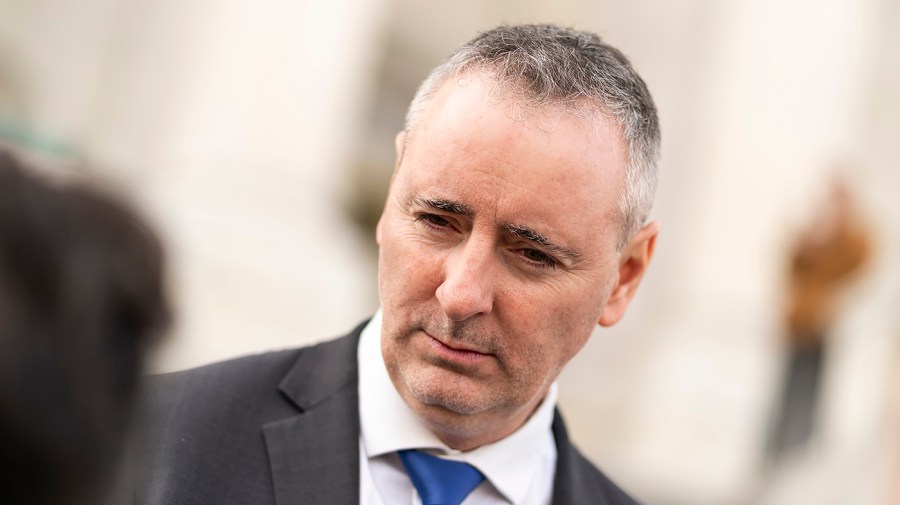Bipartisan Problem Solvers Caucus requests meeting with Trump on immigration, debt

The Problem Solvers Caucus, a bipartisan coalition of House lawmakers that frequently works across the aisle, is requesting a meeting with President Trump to discuss immigration, permitting reform and the national debt.
Reps. Brian Fitzpatrick (R-Pa.) and Tom Suozzi (D-N.Y.), the co-chairs of the caucus, sent a letter Monday to Trump, focusing on the trio issues after the faction earlier this year set up working groups to address those and more. Almost 50 lawmakers signed the request.
“As the Co-Chairs of the Problem Solvers Caucus, we lead a bipartisan group of nearly 50 Members of the House of Representatives focused on finding common ground on the key issues facing our nation,” the pair wrote. “We meet regularly to discuss opportunities for bipartisan compromise and to develop legislation that both parties can agree on and vote for.”
“In that spirit, we are writing to request a meeting with you to discuss three issues where we see both the opportunity and the need for comprehensive bipartisan solutions: immigration, permitting reform, and the national debt,” they added.
The Hill reached out to the White House for comment.
The request for a meeting comes after Republicans on Capitol Hill passed their “big, beautiful bill,” which contained many of Trump’s domestic priorities. It extended the 2017 Trump tax cuts, did away with some taxes on tips and social security, approved $150 billion for the border and rolled back some green-energy tax credits, among other priorities. To pay for the package, lawmakers made deep cuts to Medicaid.
The measure is estimated to add $3.4 trillion to the deficit over the next decade, according to the Congressional Budget Office. Fitzpatrick, who represents a purple district, was one of two Republicans — along with Rep. Thomas Massie (Ky.) — to vote against the legislation.
On the issue of the debt, the Problem Solvers Caucus is proposing creating a bipartisan, bicameral fiscal commission that would work “to develop a plan to stabilize our nation’s finances.” The co-chairs said “cutting wasteful spending is a start,” but more has to be done.
“[W]e will need to take a comprehensive look at both sides of the balance sheet — spending and revenue — in order to solve this problem,” they wrote.
On immigration, the letter praised Trump for decreasing the number of illegal border crossings to an historic low — “We thank you for restoring order to the border, and we believe you deserve credit for delivering on this campaign promise” — but the group is calling for bipartisan legislation to continue addressing the situation at the border.
“But there is still more work to do,” the co-chairs wrote. “It will take bipartisan legislation to permanently secure the border, fix the overwhelmed asylum system, and ensure that essential workers in fields like agriculture, healthcare, and hospitality can continue to contribute to our economy. We all agree the immigration system is broken — let’s work together to find a lasting solution.”
Republicans last year blocked a bipartisan border security deal, after Trump, while on the campaign trail, urged GOP members to torpedo the effort. The package, which had been the product of months of painstaking negotiations, included $6.8 billion for U.S. Customs and Border Protection, $7.6 billion for U.S. Immigration and Customs Enforcement and $4 billion for U.S. Citizenship and Immigration Services.
It also would have given the president, at the time Joe Biden, the ability to shut down the border if the daily crossing average exceeded 4,000.
And on permitting reform, the group is pressing to land a bipartisan deal to accelerate infrastructure projects in the U.S.
“Permitting reform” refers to efforts to speed up the approval process for energy and other infrastructure projects — often at the expense of environmental reviews. Republicans have long sought to cut down environmental reviews and legal challenges on environmental grounds, and to speed up timelines for approving oil, gas and nuclear projects. In recent years, some Democrats have also embraced the idea as they seek to speed up timelines for getting more renewable power built and placed on the grid.
The letter references an effort during the last Congress spearheaded by Sen. John Barrasso (R-Wyo.) and then-Sen. Joe Manchin (I-W.Va.), which failed to reach the point of an agreement.
The plan would have been expected to bolster both fossil fuels and renewable energy. Their legislation advanced through committee in a bipartisan 15-4 vote, but it was never taken up for a full vote by House or Senate leadership amid disagreements including GOP reticence to speed up approvals for new power lines, which would be expected to aid renewable energy.
“Our outdated permitting system delays crucial infrastructure and energy projects that we need to compete globally, slowing our country’s growth and raising energy costs,” the letter reads. “We need to cut red tape and make it easier and faster to build in America. Both parties acknowledge this problem and are ready to solve it.”
“We came close to a comprehensive permitting reform deal at the end of the 118th Congress, and we are confident we can find a way to get to yes this time around,” it adds.
Rachel Frazin contributed.